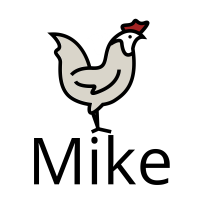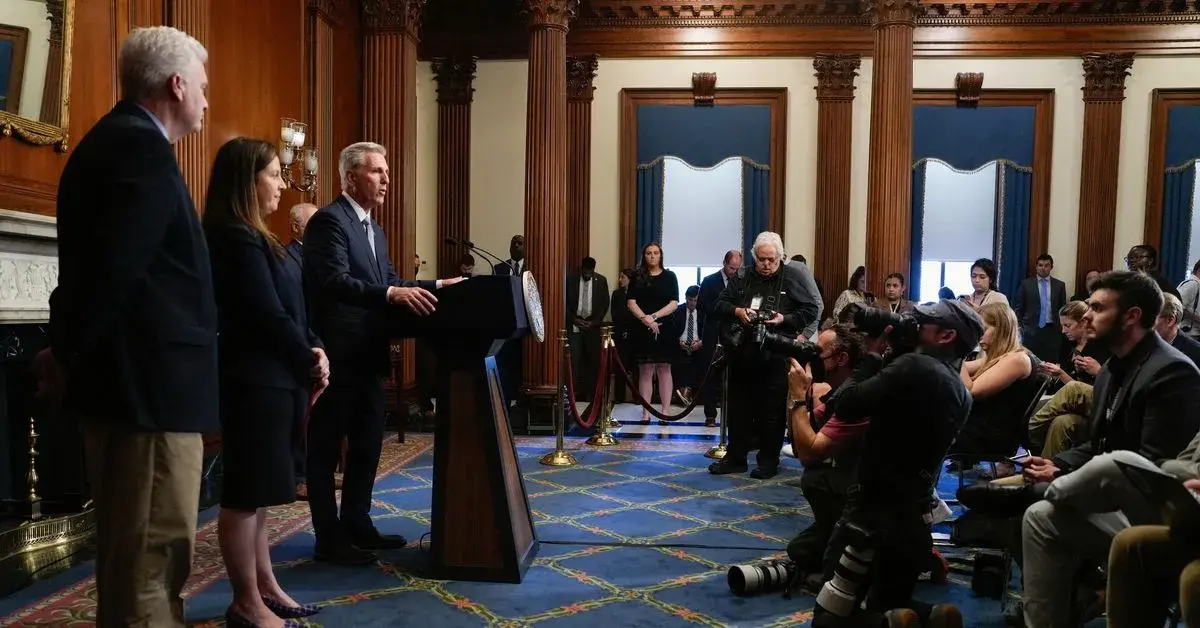
The republicans looked at the polling numbers and writing on the wall and saw this was not going to win them any support from people they didn’t already have support from…
But there is a hard line group that is probably flipping their shit right now because they don’t care, they just want to burn everything down. I don’t suspect the republican’s current coalition can survive this kind of internal disagreement for long

I don’t know. Seems like it’s been sustainable for a while. Is this not just an extension of the Tea Party? It’s been working for them.

What doesn’t seem sustainable to me is the Repubican party caucus. The right is incensed that McCarthy “caved to the Democrats”. I suspect a motion to vacate will be raised.

To be fair, the Republicans as a whole are still pretty united, this is just the Freedom Caucus people trying to throw around their brand of extra strength crazy.
McCarthy made a deal with the devil to win them over to get made Speaker, and they are going to taunt him with that every chance they get. He gets what he deserves from that alliance, which is fine by me.

This article seemed to have done better details about the drama going on in all this. Here are some tidbits since it’s paywalled. Give me a minute and I’ll get the white thing for anyone interested, because to hell with NewsCorp.
The House voted 335-91 for the funding measure, which includes $16 billion in disaster relief but omits aid for Ukraine. It also excludes border-security measures sought by Republicans.
Republicans argued that the party had exhausted its options after dissident conservatives derailed an earlier plan, and said that the only choice now was to pass a bill extending funding at 2023’s $1.6 trillion annual rate through Nov. 17. That squares with major components of the approach being taken in the Senate, except that the Senate version includes an emergency $6 billion for Ukraine.
Some Democrats had worked to rally their members against the legislation, arguing against omitting aid for Ukraine and saying that Republicans had pulled a fast one by advancing a bill that they said would enable a pay raise for members of Congress. But Republicans moved to fix the cost-of-living increase matter and questioned why Democrats would be willing to shut down their own government in the name of supporting Ukraine.
Rep. Mike Quigley of Illinois, the lone House Democrat to vote against the short-term measure, said it was because the bill didn’t include funding for Ukraine. “Putin is celebrating,” he told CNN. “We got 45 days to fix it.”
“If we win this vote, this is the bill that will be signed into law,” said Rep. Don Bacon (R., Neb.) “If they can delay this until after the Senate vote, the Senate vote is going to become law. This is what this is all about. It’s nothing about them wanting to read it.”

Link for getting past the paywall

That works too! I’m a BypassPaywalls user so I always forget about archive.
It looks to be a few hours behind though, and misses out on a bunch of important quotes that got added later.
Still, thanks for the additional resource reminder!

Congress Set to Avert Government Shutdown as House Measure Passes
Compromise keeps government funded until mid-November, while omitting Ukraine and border provisions
The House passed a measure Saturday to extend government funding through mid-November. It includes $16 billion in disaster relief.
WASHINGTON—Congress was on the verge of averting a government shutdown Saturday, after the House passed a measure with broad bipartisan support to extend funding through mid-November and sent the matter to the Senate.
White House officials said President Biden supports the measure and will sign it as soon as possible. The surprise breakthrough upended expectations that Congress was too divided to pass anything in time to keep the government from partially shutting down at 12:01 a.m. Sunday. But a delay in the Senate in quickly taking up the measure late Saturday raised the possibility of more twists in the drama.
The House voted 335-91 for the funding measure, which includes $16 billion in disaster relief but omits aid for Ukraine. It also excludes border-security measures sought by Republicans. The margin exceeded the two-thirds majority needed to clear the bill through the House, which considered the legislation under special procedures requiring a supermajority of votes. All but one Democrat voted in favor of the measure, while nearly half of Republicans voted against it.
“It’s easy to be a conservative that wants to do nothing,” House Speaker Kevin McCarthy (R., Calif.) said after the House vote. “But I believe America wants to find the conservative that can make government work efficiently, effectively and accountable.”
In reaching for a compromise, Republicans argued that the party had exhausted its options after dissident conservatives derailed an earlier plan, and said that the only choice now was to pass a bill extending funding at 2023’s $1.6 trillion annual rate through Nov. 17. That squares with major components of the approach being taken in the Senate, except that the Senate version includes an emergency $6 billion for Ukraine.
Some Democrats had worked to rally their members against the legislation, arguing against omitting aid for Ukraine and saying that Republicans had pulled a fast one by advancing a bill that they said would enable a pay raise for members of Congress. But Republicans moved to fix the cost-of-living increase matter and questioned why Democrats would be willing to shut down their own government in the name of supporting Ukraine.
The move to advance the legislation marked a major turnabout for McCarthy, who had spent months trying to appease a dissident flank that rejected his every offer. McCarthy advanced spending bills that at a net $1.471 trillion for fiscal 2024 were widely seen by Democrats as breaking his debt deal with President Biden. McCarthy then revised his approach, offering to advance bills with even steeper cuts while also saying that any stopgap measure must simultaneously provide for new restrictions on migrants. They rejected that as well.
“I have tried for eight months,” McCarthy told reporters. “It took me a long time to finally get the appropriations bills on the floor; they were delaying. I tried yesterday with the most conservative stopgap funding bill you could find,” he said. “I couldn’t get 218 Republicans.”
McCarthy dismissed opposition from conservatives who have threatened to oust him as speaker. “If somebody wants to make a motion against me, bring it. There has to be an adult in the room,” he said after the vote.
White House officials and some Democratic lawmakers cast the vote as a victory, noting that the bill excluded the deep spending cuts that conservative House Republicans were pushing, reductions that would have slashed budgets for a range of domestic programs.
Rep. Mike Quigley of Illinois, the lone House Democrat to vote against the short-term measure, said it was because the bill didn’t include funding for Ukraine. “Putin is celebrating,” he told CNN. “We got 45 days to fix it.”
Headed into the possible shutdown Sunday, federal government agencies have been alerting employees and laying out plans to bring nonessential government programs to a halt. Roughly 1.5 million civilian government workers wouldn’t be paid during a shutdown, while 800,000 employees deemed essential would continue working, according to the White House budget office. That number could change if a shutdown dragged on.
Just getting to the vote Saturday contained hours of drama. The House was stuck in a suspended state after House Minority Whip Katherine Clark (D., Mass.) made a motion to adjourn, saying that Democrats needed time to read the bill because “we have serious trust issues.”
Republicans said that Democrats were stalling to give the Senate time to clear the last big roadblock to passing its own stopgap measure—a bid to give that version the best chance at being enacted into law.
“If we win this vote, this is the bill that will be signed into law,” said Rep. Don Bacon (R., Neb.) “If they can delay this until after the Senate vote, the Senate vote is going to become law. This is what this is all about. It’s nothing about them wanting to read it.”
In the Senate, Democratic leaders instructed the sergeant at arms to round up absent senators so that they could speed up a pivotal vote. Republicans said that Rep. Jamaal Bowman (D., N.Y.) pulled a fire alarm in the Cannon House Office Building earlier Saturday, which Republicans said was his attempt to stall the vote in the House. His spokesperson didn’t immediately respond to a request for comment. And Minority Leader Hakeem Jeffries (D., N.Y.), moving to delay the vote, stood up on the House floor to speak.
“Strap in because this may take a while,” Jeffries said, taking advantage of a special privilege available only to leaders, known as the “magic minute,” to bust through normal restrictions on lawmaker speeches. Normally, lawmakers would have to stay within their party’s remaining debate time—which for Democrats had been six minutes.
House Minority Leader Hakeem Jeffries tried to delay the House vote to give the Senate’s stopgap measure an edge.
Critics of a short-term deal said McCarthy gave in too easily.
“Total capitulation,” said Rep. Bob Good (R., Va.), who has indicated he would be open to supporting an effort to oust McCarthy as speaker. “He has failed to do anything that he’s promised to do, including passing a bill that got every Democrat vote. Every Democrat vote!”
President Biden had declined to meet with McCarthy, urging the speaker to stick to the budget deal both parties agreed to earlier this year. The agreement set top-line spending levels for the coming fiscal years. The White House has excoriated House Republicans for bringing the government to the brink of a shutdown, warning of wide-ranging fallout.
Most routine federal food-safety inspections would cease in a shutdown, national parks would close, new small-business loan applications wouldn’t be processed and a supplemental nutrition program for women and children would run out of funding within days. Smithsonian Institution museums could close after Oct. 7. Many essential services—like the mail and the delivery of Social Security checks—would continue.
Federal agencies, with White House guidance, are required to figure out what operations can continue under an 1884 law called the Antideficiency Act that says it is illegal for the U.S. government to spend more money than Congress granted for that fiscal year. That law grants exceptions for safety and property protection. Presidents have taken differing approaches to national parks during prior shutdowns.
Here's a short summary of the linked article
The US House of Representatives passed a stopgap funding bill to avoid a government shutdown. The bill passed with bipartisan support after Republican Speaker Kevin McCarthy backed down from demands for only Republican votes. This averted a shutdown that would have started at midnight. Democrats celebrated the passage as a win, with over 200 of their members voting for it. McCarthy said he acted as the “adult in the room” to prevent a shutdown, despite risks to his position as leader. The funding fight focuses on a small part of the overall federal budget but raises concerns about the country’s creditworthiness.
The passage buys Congress more time to negotiate detailed legislation setting funding levels for federal programs.
This comment was generated by a bot. Send comments and complaints via private message.
🤖 I’m a bot that provides automatic summaries for articles:
Click here to see the summary
McCarthy abandoned party hardliners’ earlier insistence that any bill pass the chamber with only Republican votes, a change that could cause one of his far-right members to try to oust him from his leadership role.
Federal agencies had already drawn up detailed plans that spell out what services would continue, like airport screening and border patrols, and what must shut down, like scientific research and nutrition aid to 7 million poor mothers.
“Extreme MAGA Republicans have lost, the American people have won,” top House Democrat Hakeem Jeffries told reporters ahead of the vote.
Democratic Representative Don Beyer said: “I am relieved that Speaker McCarthy folded and finally allowed a bipartisan vote at the eleventh hour on legislation to stop Republicans’ rush to a disastrous shutdown."
He said that House Republicans would push ahead with plans to pass more funding bills that would cut spending and include other conservative priorities, such as tighter border controls.
This year, a group of Republicans has blocked action in the House as they have pressed to tighten immigration and cut spending below levels agreed to in the debt-ceiling standoff last spring.
Saved 68% of original text.



